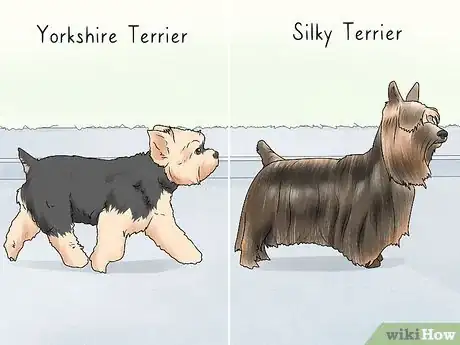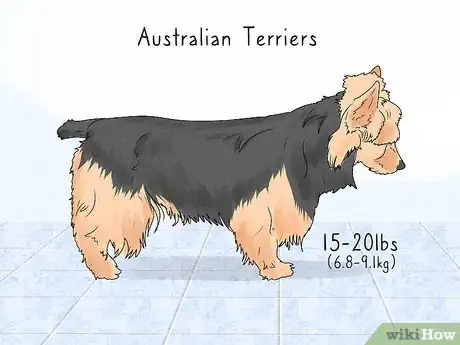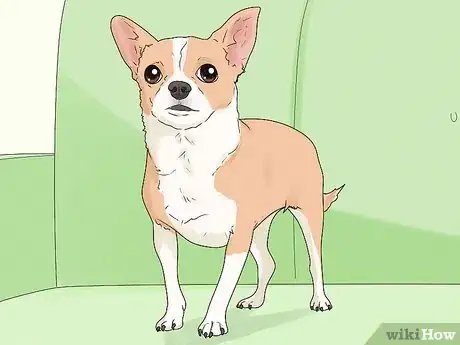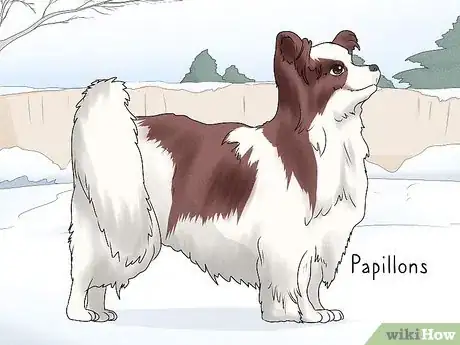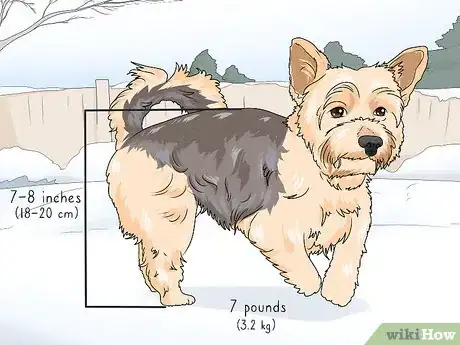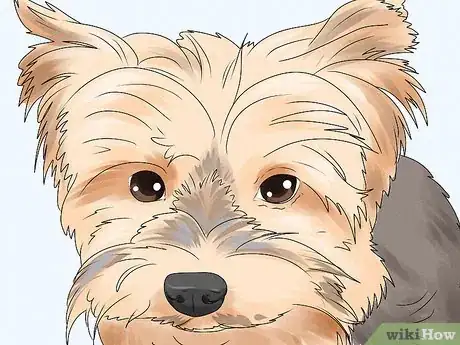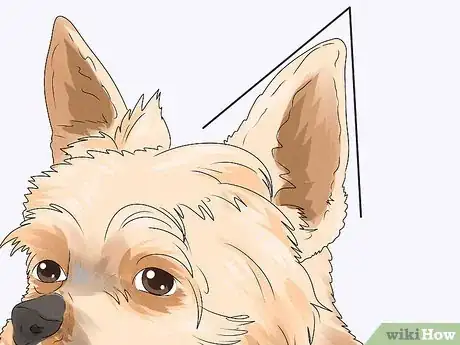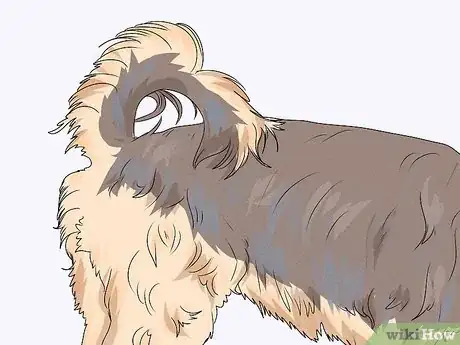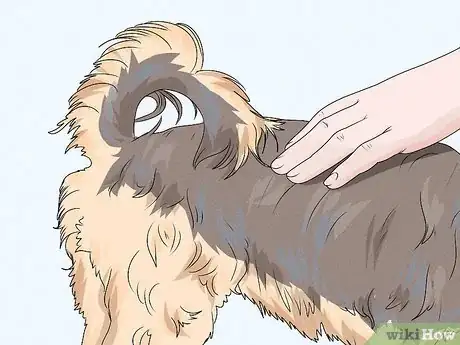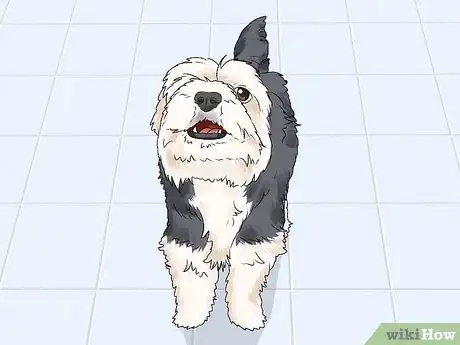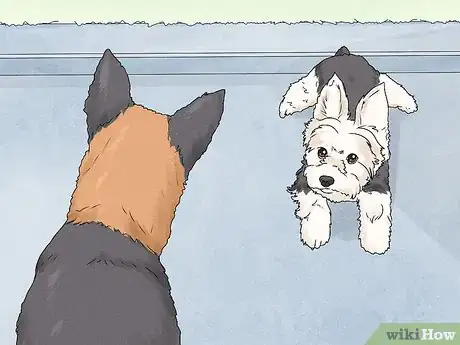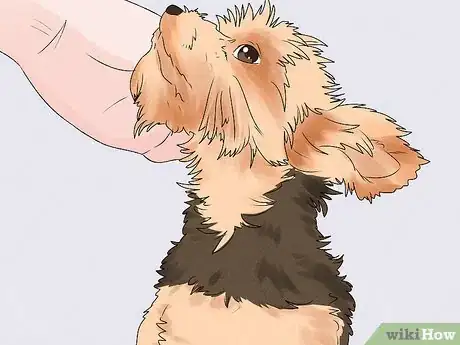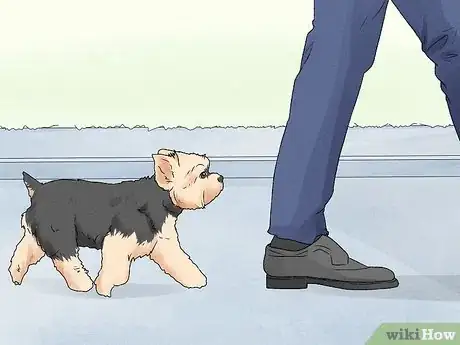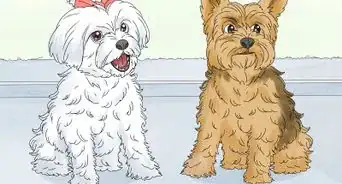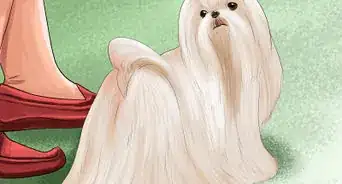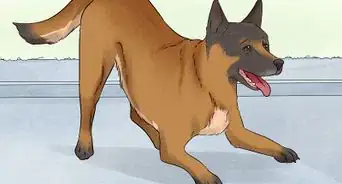wikiHow is a “wiki,” similar to Wikipedia, which means that many of our articles are co-written by multiple authors. To create this article, volunteer authors worked to edit and improve it over time.
There are 22 references cited in this article, which can be found at the bottom of the page.
This article has been viewed 30,767 times.
Learn more...
Yorkshire Terriers, also called Yorkies, are one of the most popular dog breeds.[1] Originally bred to pursue rodents, they became lapdogs in late Victorian times and are a member of the toy group.[2] Yorkies share some traits with other breeds but do have some key identifying features. This wikiHow will help you know whether or not a dog is a Yorkshire Terrier.
Steps
Differentiating Between Similar Breeds
-
1Know if the dog is a Yorkshire Terrier or a Silky Terrier. Silky Terriers are an Australian breed and a part of the toy group.[3] Silkys and Yorkies are remarkably similar in appearance, since Yorkies were part of Silkys' development.[4] The breeds are close in size, though Silkys are the larger of the two, being 10–11 pounds (4.5–5.0 kg).[5] Both breeds have straight, silky blue and tan coats; however, the coat of a Silky isn't as long as a Yorkie's for show. Silkys have more of a wedge-shaped head while Yorkies have round heads, and a Silky's ears are sharper and not as large at the base.[6] Yorkies and Silkys have similar terrier temperaments, but a distinct characteristic of the Silky Terrier is being alert and constantly watchful.[7]
-
2Identify differences between Yorkshire Terriers and Australian Terriers. Australian Terriers are another native Australian breed, and they are a member of the terrier group.[8] Aussies are larger than Yorkies, weighing 15–20 pounds (6.8–9.1 kg).[9] Both Aussies and Yorkies may be seen with blue and tan coats, though Aussies may also be solid sandy or solid red in color.[10] Australian Terriers have harsh, straight coats[11] rather than the straight, silky coat of a Yorkie. When it comes to temperament, Aussies are spirited and alert.[12]Advertisement
-
3Understand how Yorkshire Terriers and Maltese differ. The Maltese is a popular breed from the toy group that was once a fashion symbol in Rome.[13] Maltese and Yorkies are almost identical in size; Maltese stand at 7–9 inches (18–23 cm) in height with a weight of under 7 pounds (3.2 kg).[14] While Yorkies sport blue and tan coats, Maltese are solid white with long, straight single coats.[15] The tail of a Maltese is carried over the back,[16] while a Yorkie's tail is docked to a medium length. Maltese are affectionate and gentle yet lively.[17]
-
4See if the dog is a Yorkshire Terrier or a Chihuahua. Chihuahuas are a national symbol of Mexico and part of the toy group.[18] Yorkies are very small dogs, but Chihuahuas are even smaller, weighing no more than 6 pounds (2.7 kg) and standing at 5–8 inches (13–20 cm) tall.[19] Chihuahuas have large, erect ears and undocked sickle tails,[20] while a Yorkie's tail is typically docked. Yorkies are blue and tan, but a Chihuahua's soft coat, which may be smooth or long, may be any color or pattern.[21] Chihuahuas are terrier-like in temperament and are alert and confident.[22]
-
5Recognize how Yorkshire Terriers and Pomeranians differ. Pomeranians are a spitz-type breed and part of the toy group.[23] Yorkies are one of the smallest breeds, but Pomeranians can be smaller, standing at 6–7 inches (15–18 cm) in height and weighing 3–7 pounds (1.4–3.2 kg).[24] They have small, erect ears and, unlike the docked tail of a Yorkie, a heavily plumed tail that lies flat and straight on the back.[25] Pomeranians have long, harsh double coats that may be any color or pattern.[26] When it comes to temperament, Pomeranians are extroverted, being vivacious and intelligent.[27]
-
6Tell the differences between Yorkshire Terriers and Papillons. Papillons are a European toy breed.[28] Like Yorkies, Papillons are small dogs, but they are slightly larger than Yorkies, having a weight of 5–10 pounds (2.3–4.5 kg) and a height of 8–11 pounds (3.6–5.0 kg).[29] A Papillon may have erect or drop ears, the erect ears resembling butterfly wings and the drop ears being completely down.[30] Papillons have long, silky, straight coats, similar to a Yorkie, but are always parti-color or white with patches of any color.[31] They are happy, alert, and friendly.[32]
-
7Spot differences between Yorkshire Terriers and Shih Tzu. The Shih Tzu is a toy breed from Ancient China.[33] Shih Tzu are small dogs but larger than Yorkies, being 9–10.5 inches (23–27 cm) tall with a weight of 9–16 pounds (4.1–7.3 kg).[34] Shih Tzu have long, flowing coats that may be slightly wavy and come in every color.[35] Instead of a docked tail, Shih Tzu have tails that curl over the back.[36] The personality of a Shih Tzu is described as outgoing, happy, and friendly.[37]
Examining the Body Structure
-
1Pay attention to the dog's size. Yorkshire Terriers are very small dogs. They are 7–8 inches (18–20 cm) tall and weigh under 7 pounds (3.2 kg).[38]
- Sometimes people consider "Teacup Yorkies" a separate size,[39] but these aren't recognized as an individual size of Yorkshire Terrier by dog show standards.
-
2
-
3Inspect the ears. Yorkies have small ears that are carried erect. They are V-shaped and set not too far apart.[42]
-
4Examine the muzzle. The muzzle of a Yorkshire Terrier is not too long. The head is small and rather flat on the top, and Yorkies may have either a scissors or level bite, with a black nose.[43]
-
5Check the tail. A Yorkie's tail is carried slightly higher than the level of the back. For show, it is docked to a medium length,[44] though it may be kept long otherwise.
-
6
Looking at the Coat
-
1Analyze the texture of the coat. Yorkshire Terriers have glossy, fine, silky hair.[47] The coat is moderately long and perfectly straight, with very long hair on the muzzle.[48] Yorkies may have hair tied up with a bow on the head.[49]
- Yorkies have long hair for show, but a Yorkie may be seen with a different haircut. This may include having the coat trimmed short.
Did you know? The hair of a Yorkshire Terrier is similar in texture to that of humans.[50]
-
2Check the coat color. Yorkies have blue and tan coats. The blue is a dark steel-blue color that extends over the body from the back of the neck to the tail, and the tail may even have a darker blue.[51] The head is a rich golden tan that may be darker at the sides, ears, and muzzle.[52] The chest and legs are a bright tan that doesn't extend above the elbows.[53]
- Puppies are born with black and tan coats, and they are normally darker in color, with an intermingling of black hair with tan until the dog matures, so take age into account.[54]
-
3Understand that Yorkshire Terriers are not white. Though they may have a small white spot on the forechest,[55] Yorkshire Terriers aren't seen in white. The Biewer Terrier is another toy terrier breed that was originally from a piebald gene in Yorkies.[56] They are tri-colored, being blue or black, gold or tan, and white. Biewers are now recognized as a separate breed from Yorkies,[57] not as piebald or parti Yorkies.
- Some people consider the "Parti Yorkie" and Biewer Terrier separate breeds, the former being a Yorkshire Terrier with white markings. However, dog show standards only permit solid blue and tan Yorkies, with only a small spot of white on the chest permissible.[58]
- Additionally, solid white and gold dogs are considered their own breed or a variety of Biewer Terrier called the Golddust Yorkshire Terrier.[59]
Understanding Temperament
-
1See if the dog is attention-seeking. Yorkies like being the center of attention. This may lead to frequent barking or stubbornness if they aren't given the attention they desire.[60]
-
2Expect high self-esteem. Yorkshire Terriers are spunky and don't act their size. They may try to act dominant or aggressive and may stand up to bigger dogs.[61]
-
3Notice if the dog is protective. A Yorkie may be wary or suspicious of strangers. Combined with their barking, this can make them good watchdogs.[62]
-
4Check if the dog is affectionate. Yorkshire Terriers are very affectionate and loyal. Once they learn their place in the household, they are loving and show more signs of affection, such as sitting on their owner's lap.[63]
-
5Watch for a desire to be with their owner. Yorkies are possessive of their owners and don't enjoy being alone. They are prone to having separation anxiety if they aren't around their owner.[64]
References
- ↑ https://www.akc.org/expert-advice/dog-breeds/2020-popular-breeds-2019/
- ↑ https://www.akc.org/dog-breeds/yorkshire-terrier/
- ↑ https://www.akc.org/dog-breeds/silky-terrier/
- ↑ https://www.akc.org/expert-advice/dog-breeds/yorkshire-terrier-vs-silky-terrier/
- ↑ https://www.akc.org/expert-advice/dog-breeds/yorkshire-terrier-vs-silky-terrier/
- ↑ https://www.akc.org/expert-advice/dog-breeds/yorkshire-terrier-vs-silky-terrier/
- ↑ https://www.akc.org/expert-advice/dog-breeds/yorkshire-terrier-vs-silky-terrier/
- ↑ https://www.akc.org/dog-breeds/australian-terrier/
- ↑ https://www.akc.org/dog-breeds/australian-terrier/
- ↑ http://images.akc.org/pdf/breeds/standards/AustralianTerrier.pdf
- ↑ http://images.akc.org/pdf/breeds/standards/AustralianTerrier.pdf
- ↑ http://images.akc.org/pdf/breeds/standards/AustralianTerrier.pdf
- ↑ https://www.akc.org/dog-breeds/maltese/
- ↑ https://www.akc.org/dog-breeds/maltese/
- ↑ http://images.akc.org/pdf/breeds/standards/Maltese.pdf
- ↑ http://images.akc.org/pdf/breeds/standards/Maltese.pdf
- ↑ http://images.akc.org/pdf/breeds/standards/Maltese.pdf
- ↑ https://www.akc.org/dog-breeds/chihuahua/
- ↑ https://www.akc.org/dog-breeds/chihuahua/
- ↑ http://images.akc.org/pdf/breeds/standards/Chihuahua.pdf
- ↑ http://images.akc.org/pdf/breeds/standards/Chihuahua.pdf
- ↑ http://images.akc.org/pdf/breeds/standards/Chihuahua.pdf
- ↑ https://www.akc.org/dog-breeds/pomeranian/
- ↑ https://www.akc.org/dog-breeds/pomeranian/
- ↑ http://images.akc.org/pdf/breeds/standards/Pomeranian.pdf
- ↑ http://images.akc.org/pdf/breeds/standards/Pomeranian.pdf
- ↑ http://images.akc.org/pdf/breeds/standards/Pomeranian.pdf
- ↑ https://www.akc.org/dog-breeds/papillon/
- ↑ https://www.akc.org/dog-breeds/papillon/
- ↑ http://images.akc.org/pdf/breeds/standards/Papillon.pdf
- ↑ http://images.akc.org/pdf/breeds/standards/Papillon.pdf
- ↑ http://images.akc.org/pdf/breeds/standards/Papillon.pdf
- ↑ https://www.akc.org/dog-breeds/shih-tzu/
- ↑ https://www.akc.org/dog-breeds/shih-tzu/
- ↑ http://images.akc.org/pdf/breeds/standards/ShihTzu.pdf
- ↑ http://images.akc.org/pdf/breeds/standards/ShihTzu.pdf
- ↑ http://images.akc.org/pdf/breeds/standards/ShihTzu.pdf
- ↑ https://www.akc.org/dog-breeds/yorkshire-terrier/
- ↑ https://thehappypuppysite.com/teacup-yorkie/
- ↑ http://images.akc.org/pdf/breeds/standards/YorkshireTerrier.pdf
- ↑ http://images.akc.org/pdf/breeds/standards/YorkshireTerrier.pdf
- ↑ http://images.akc.org/pdf/breeds/standards/YorkshireTerrier.pdf
- ↑ http://images.akc.org/pdf/breeds/standards/YorkshireTerrier.pdf
- ↑ http://images.akc.org/pdf/breeds/standards/YorkshireTerrier.pdf
- ↑ http://images.akc.org/pdf/breeds/standards/YorkshireTerrier.pdf
- ↑ http://images.akc.org/pdf/breeds/standards/YorkshireTerrier.pdf
- ↑ http://images.akc.org/pdf/breeds/standards/YorkshireTerrier.pdf
- ↑ http://images.akc.org/pdf/breeds/standards/YorkshireTerrier.pdf
- ↑ http://images.akc.org/pdf/breeds/standards/YorkshireTerrier.pdf
- ↑ https://www.akc.org/expert-advice/lifestyle/7-things-about-yorkshire-terriers/
- ↑ http://images.akc.org/pdf/breeds/standards/YorkshireTerrier.pdf
- ↑ http://images.akc.org/pdf/breeds/standards/YorkshireTerrier.pdf
- ↑ http://images.akc.org/pdf/breeds/standards/YorkshireTerrier.pdf
- ↑ http://images.akc.org/pdf/breeds/standards/YorkshireTerrier.pdf
- ↑ http://images.akc.org/pdf/breeds/standards/YorkshireTerrier.pdf
- ↑ https://www.akc.org/dog-breeds/biewer-terrier/
- ↑ https://www.akc.org/dog-breeds/biewer-terrier/
- ↑ http://images.akc.org/pdf/breeds/standards/YorkshireTerrier.pdf
- ↑ https://www.dogbreedinfo.com/g/golddustyorkshireterrier.htm
- ↑ https://www.dogtemperament.com/yorkshire-terrier-temperament-yorkie/
- ↑ https://www.dogtemperament.com/yorkshire-terrier-temperament-yorkie/
- ↑ https://www.dogtemperament.com/yorkshire-terrier-temperament-yorkie/
- ↑ https://www.dogtemperament.com/yorkshire-terrier-temperament-yorkie/
- ↑ https://www.dogtemperament.com/yorkshire-terrier-temperament-yorkie/
